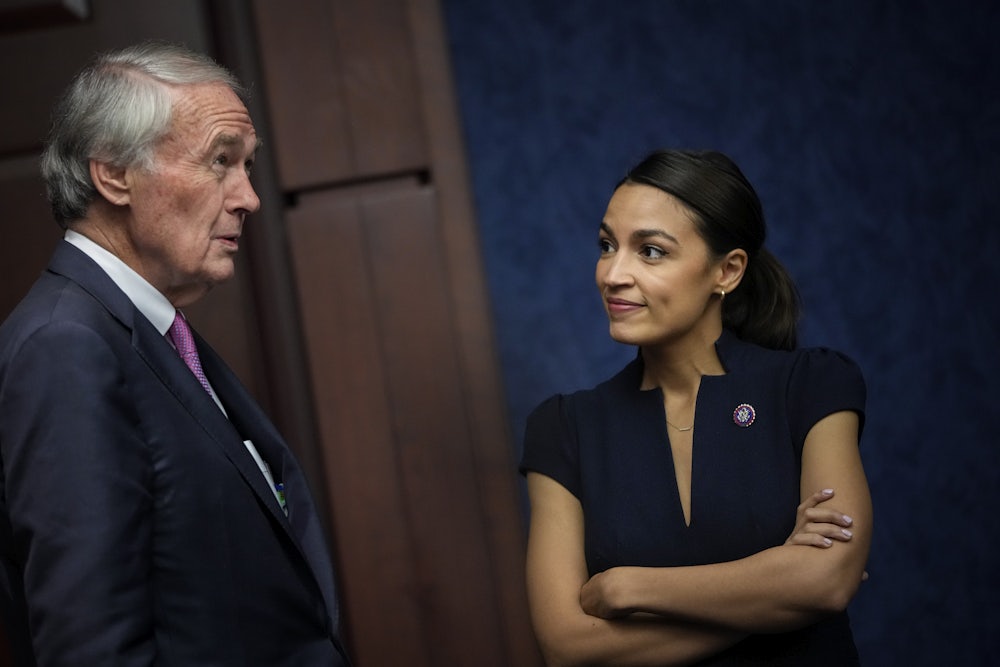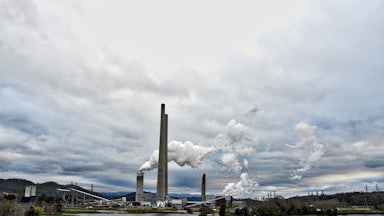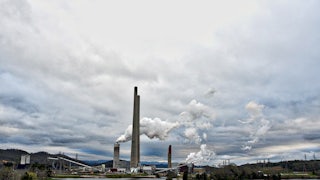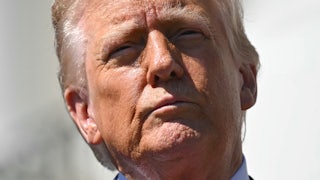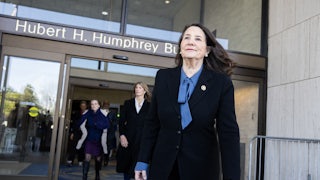With prospects for comprehensive climate legislation looking dim, a number of congressional Democrats and several dozen progressive groups are set to unveil a “Green New Deal Champions” pledge for congressional candidates on Monday. It’s intended to further define what it means for both sitting and aspiring federal lawmakers to support the Green New Deal, adding meat to the bones of a framework critics have long accused of being both too broad and not specific enough.
Representative Alexandria Ocasio-Cortez and Senator Ed Markey first introduced the original Green New Deal Resolution in 2019. But as of Monday, being a “Green New Champion” will mean not merely signing on to that resolution but backing a suite of nine bills that includes Green New Deals for Schools, Public Housing, and Cities. Though candidates are being asked to sign the pledge, it’s also a means of holding currently serving members to the same standards.
The pledge document provided to The New Republic clarifies that the list of included legislation, compiled through months of consultation between Hill staffers, climate groups, and unions, “is not exhaustive and does not represent every piece of legislation that would comprise the Green New Deal.” (Their emphasis.) Signatories also commit to organizing their colleagues and using their “committee, caucus, and/or leadership positions to advance the Green New Deal,” publicly advocating for it while contributing to and championing new bills that fulfill its “vision and ambition.” In addition, all signatories must reject donations of more than $200 from fossil fuel executives, lobbyists, and PACs. So far, 22 members of Congress meet the criteria outlined in the pledge, and 46 candidates have signed on. Partly as a result of the organizing effort that brought together the pledge—including asking members to sign on to additional Green New Deal bills—more than half of House Democrats are now signed on to that chamber’s original Green New Deal resolution, H.R. 109.
“Since I introduced the Green New Deal with Congresswoman Ocasio-Cortez, the climate crisis has only become more severe,” Ed Markey said in a press statement about the new pledge. “We have to act now to deliver justice for communities on the frontlines of this crisis and create millions of green-collar jobs to save our economy and save our planet.”
You could be forgiven for finding the pledge’s timing a bit odd. After more than a year of negotiations, Democrats’ ability to pass the surviving shreds of Biden’s Build Back Better agenda—already a fraction as ambitious as the Green New Deal in its fullest form—remains an open question. Doing so could entail serious trade-offs. West Virginia Democrat Joe Manchin is reportedly proposing a slate of new demands in exchange for his crucial vote. Among them, he suggests what amounts to a blank check for years of continued fossil fuel development.
So what exactly do these climate champions hope to gain with their new pledge and more stringent definition of what it means to back the Green New Deal? They say that, while under no illusions their suite of bills will pass anytime soon, they want to be prepared for the next time there’s a legislative opening.
“We knew from the beginning that this package [Build Back Better] was never going to be the Green New Deal,” says Adrien Salazar, policy director of the Grassroots Global Justice Alliance, a network signed on to the pledge. “Even if we win the small slice of it that folks are still negotiating—as large as those investments could be—it would be insufficient. This pledge is charting the long course of this fight,” Salazar added. “If we’re actually talking about winning a Green New Deal, we will need strong bills that delineate the bold vision we need. And we need them to be ready to come off the shelf.”
A climate staffer in a Squad office told me by phone that these bills are part of a new, forward-looking strategy: “We’re building backward from trying to build a Green New Deal before 2030,” the staffer said. “Even if you’re in the minority, building support among Democrats for these bills is important. It’s also just about socializing something in Congress.”
It’s worth backing up to understand what led up to this point. As Democrats narrowed in on a House majority in 2018, there was a hunger among the party’s leftmost wing for big ideas about how to handle the country’s most entrenched problems, from a federal job guarantee to baby bonds, and—eventually—a Green New Deal. The inaugural class of Squad members elected that year came to Washington ready to fight for those goals, and Democratic presidential candidates in the 2020 primaries competed over who could spend the most money to tackle the climate crisis. That moment of progressive fervor has since passed, battered by Joe Biden’s primary win over his further-left challengers, a pandemic, and Democrats’ crushingly thin control of both Houses. Getting a filibuster-proof majority on any big legislative projects would be nearly impossible with Republicans universally opposed to the idea of the other party governing. So now, having embraced a fair number of those big ideas from the before times, congressional Democrats are attempting to stack them like Tetris cubes into the box of a reconciliation measure that could pass by 50 votes, with Vice President Kamala Harris acting as tie-breaker.
Getting the 50 votes for even the reconciliation measure has so far proved impossible. Though hardly alone among Democrats in wanting to stamp out insurgent energy from the left, Joe Manchin—who was a key vote blocking filibuster reform, too—collected a small fortune in donations from fossil fuel companies as the fight over Build Back Better heated up, on top of the half a million dollars a year he’s been raking in off his family’s own coal business. His donors got their “return on investment,” as he phrased it at a recent oil and gas industry conference. And climate advocates’ hope for a reasonably comprehensive spending package got crushed.
What remains on the table for the planet is a large, temporary set of tax breaks for clean energy. It’s likely that Democrats will lose their congressional majority in this November’s midterm elections. Their next chance to pass climate policy could be nearly a decade away, by which point some of the same youth climate activists who first fought for a Green New Deal will be approaching middle age.
It’s even possible at this point that a legislative deal on Manchin’s terms—he wants to strip out all the social programs from the original plan and incorporate lots of perks for the fossil fuel industry in exchange for some spending on renewables—could end up being worse than no deal. “All of the above” energy policy, as this sort of strategy was called during the Obama administration, has a record of increasing greenhouse gas emissions, rather than decreasing them. “We’d have to see it,” the Squad office climate staffer said of Manchin’s plan, noting that what Manchin says he’ll vote for seems to change by the day. “The Squad is willing to push for things that are not our first choice and are too small, but if you keep shrinking it and adding bad things, then at some point the scales might shift.”
In the few years since they were elected, Squad offices and their less high-profile allies in the House and Senate have built up a core of young, progressive staffers eager to coordinate both amongst themselves and with movements that traditionally haven’t had much of a voice in Beltway policymaking circles. The pledge is a product of that process, the sort of grinding and often frustratingly slow trust- and coalition-building that slots in uncomfortably alongside the urgency of the crisis.
“A lot of it is unsexy work,” the staffer said, “but we’re steadily marching toward a Green New Deal even while philanthropy cycles change, the media shifts to other things, and Republicans take control.” Savviness about the Hill’s Byzantine idiosyncrasies takes time to build, though; to hear those involved with the process tell it, that know-how simply didn’t come together in enough time to make a more Green New Deal–like Build Back Better viable.
Still, advocates say they take pride in having moved the goalposts of the party’s governing agenda. That the administration has treated climate policy as an issue of large-scale investment industrial policy, rather than market-based tweaks, can be chalked up largely to the Green New Deal’s influence over climate policy debates at home and abroad. And it’s a far cry from where the party was a decade ago, when carbon pricing was the centerpiece of Democrats’ climate agenda.
“The Build Back Better fight was first shaped by the Squad and outside movements trying to hold down the size and scope of the package we actually need,” Sunrise Movement advocacy director Lauren Maunus told me. “If we hadn’t set that opening bid, that package would have been a lot smaller form the outset, with even more compromises.”
Understandably, however, left-leaning groups especially don’t hold out much hope that they’re going to change Joe Manchin’s mind. The ball is in his court, at this point. Climate advocates are finding their footing, and figuring out just how long the path to slashing emissions might be at this point. “I would just say this is a regrounding in the role of the movement for the Green New Deal,” Maunus added.
Whether more preparation would have been enough to break down the wall of Manchin and his Blue Dog cohorts’ opposition isn’t really clear. But getting additional legislators committed to a Green New Deal, climate campaigners tell me, remains an unavoidable part of working toward it—even if that means toiling away in the obscurity of opposition.
Progressives more broadly worry that Democrats are walking into the midterms without much to show for themselves, and climate groups have had to pivot somewhat awkwardly around what to do about rising gas prices. Still, they reason, voter worries about climate policy aren’t going away. If Democrats want people to come out to vote, phonebank, and knock doors for them, they’ll need to treat them as something other than expendable: They’ll need at least to give voters a taste of what Democrats stand for. As Squad-style progressive primary challengers proliferate, the pledge gives them a chance to differentiate themselves from incumbents—and a way for those incumbents to step up that goes beyond rhetoric.
“The reality is that a Green New Deal is popular, and we don’t have the luxury of waiting to take action for our children’s future,” Greg Casar, who recently won his primary for Texas’s 35th congressional district, said over email. Asked about what fighting for a Green New Deal looks like while Democrats are in the minority, he said the party will “continue to organize with working people, because a Green New Deal is our path to accomplishing progress for working families everywhere.”
The irony of this moment is that while the Green New Deal’s legislative prospects look about as bleak as they ever have, the case for them has never looked better. More than 65 percent of likely voters support Green New Deal measures for cities, public housing, and schools despite their still minuscule support in the House and Senate, recent polling from Data for Progress found. And in addition to the the steady drumbeat of climate disasters and sobering studies released since the Green New Deal was first unveiled, the invasion of Ukraine has made a new case for massive investments in renewables and energy efficiency. The security risk of relying on fossil fuels’ authoritarian-stacked supply chains has never been more obvious, and slashing domestic oil and gas demand is among the quickest things the United States can do to ensure energy security abroad. Bringing on new drilling and export terminals could take years, but if Americans start consuming fewer fossil fuels—via new energy efficiency or public transit initiatives—that could free up already flowing fuel to head to Europe, proving especially useful if Russia decides to turn off the gas taps.
For now, Green New Deal advocates aren’t even close to calling the shots in Congress. Meanwhile, world events continue to make the case for the policies they support.
